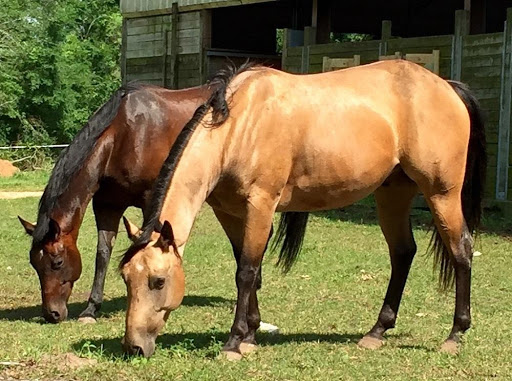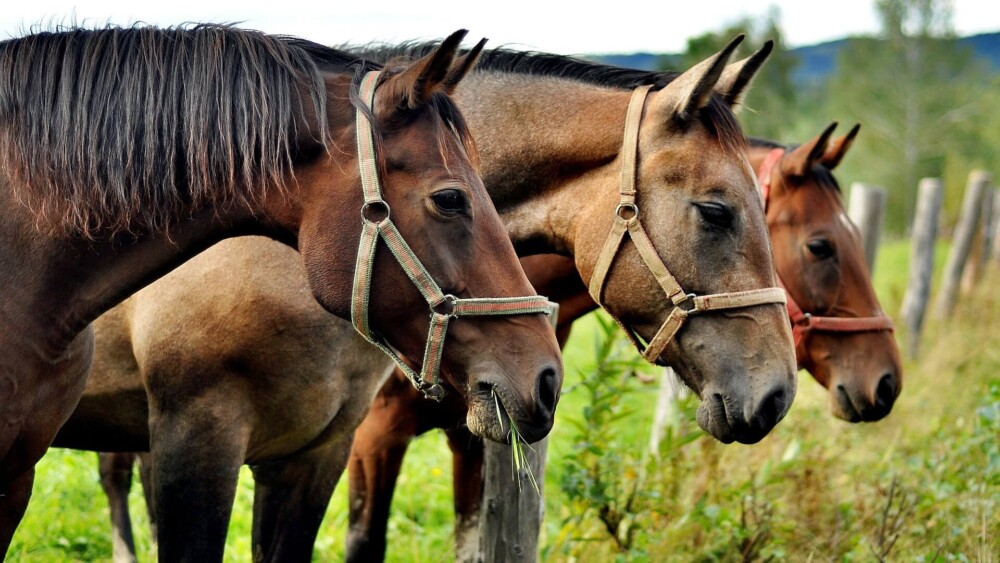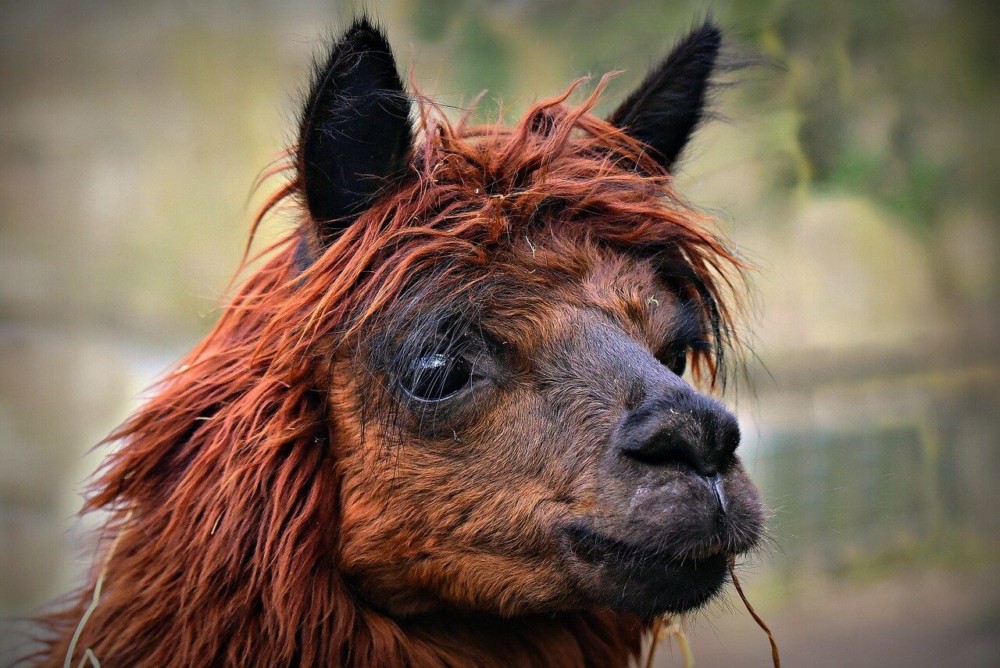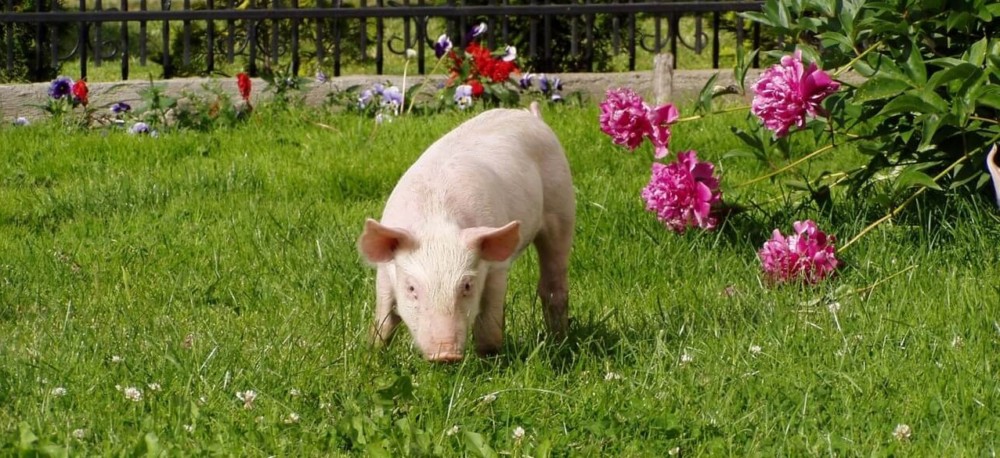Horses are herd animals, meaning they don’t do well alone. Solo horses can suffer from eating issues, depression and will often have more significant health problems. But, sometimes, it isn’t possible to have multiple horses. Fortunately, other animals can provide companionship for horses.
What are the Best Animal Companions for a Horse? Animals that provide the best companionship to horses are another horse, a miniature horse, a donkey, a mule, a goat, an alpaca, sheep, a pig, or chickens. Horses do better with animals of the same species or similar species, such as miniature horses, donkeys, or mules.
Goats, alpacas, and sheep are the next best fit. Occasionally pigs and chickens will work as a pasture mates. Not all animals make good companions for horses, even if their species usually do. It’s essential to find a companion that your horse can get along with. That will depend on your horse’s personality. Rest assured, with time and patience, you can find the right fit for every horse. These valuable tips will help you find that perfect companion and keep your horse happy and healthy!
Why Horses Need a Pasture Mate
Horses need a pasture mate because they are herd animals. Herd animals are also considered ‘prey’ animals, and in nature, prey animals are subject to predation by predators. Horses happen to be among the most sensitive and responsive of prey animals and are keenly aware of this fact.
This accounts for many of the stall vices and pasture vices found in the equine species. Horses kept alone can become highly insecure, and that insecurity can manifest itself in many ways, all of which are unhealthy for the horse.
Here are just some of the damaging vices resulting from an isolated horse. Isolation can occur in a stall or paddock for too long.
- Weaving – A horse moving side to side for long periods, potentially causing physical damage.
- Cribbing –A horse grasps an object with its top front teeth (incisors) and sucks in large amounts of air. This can result in weight loss, tooth damage, and gastric ulcers.
- Excessive pawing – Can damage hooves and cause lameness.
- Pacing – This repetitive motion can result in physical injury.
- Excessive vocalization – Besides being annoying, it can cause damage to the larynx and result in a loss of appetite, causing weight loss.
- Breaching – When a horse physically breaks out of its stall, paddock, or pasture, attempting to get to another horse or animal. This can result in catastrophic injury.
Prey or herd animals are inherently insecure and crave companionship. Like all herd animals, a horse primarily concerns itself with just three things throughout a typical day, being comfortable, sustenance, and their safety. Understanding the root cause of the behaviors listed here is important in providing adequate and safe quarters for your horse and a suitable companion.
Best Companion Animals for a Horse
The following is a list of animals that have proven to be suitable companions for horses. As you will see, some are better suited than others, but the bottom line is that some form of companionship is better than none when considering the needs of a herd animal.
1. Another Horse
The best companion for a horse would naturally be another horse.
If the desire is only to own and be responsible for one horse, but you have the room for a second, you could consider allowing a boarder who only has one horse as well. This could resolve the companionship issue for two horses.
If you are going to keep two horses close to one another, it is ‘best practice’ that they are the same gender, so you don’t get an accidental pregnancy.
In larger herds, the mares control the social order outside of the breeding season and the herd stallion’s absence. As a result, when a gelding is kept with a mare and then is separated, both horses can become insecure and act out in unsafe ways for their human handlers. A castrated equine is gelded.
2. A Mule
A mule is from the equine family. They are hybrids as they are a cross between a female horse and a male donkey or burro. They make great companions to horses and are relatively low maintenance. Mules are hybrids and do not reproduce. But, due to herd dynamics, it would still be wise to match the sex of your horse with the sex of the mule. This will help avoid behavioral issues when separated.
3. A Donkey or Burro
A donkey can also be a great companion for a horse and are also low maintenance. Matching the sex of equine pairs is vital to avoid problems when separating them. If you are pairing a male donkey with a gelding, it would be wise to make sure that the donkey is gelded as well.
Of course, if you have a mare, you would want to pair her with a ‘Jennie’ or female donkey.
4. A Miniature Horse or Donkey
Mini horses have proven their worth as companion animals for horses. If you choose a mini, you must remember to apply the same rule. You should match the sex of your horse because the same herd dynamic will affect the relationship between your mini and your horse.
The size difference between a mini and a standard horse can put the mini at a dangerous disadvantage so take care when introducing them. Make sure it is a gradual and safe process.
5. An Alpaca
Alpacas can be great companions for horses.
The sex of the alpaca will not be significant since they are not of the equine species. I recommend that if you choose a male, he should be gelded as they are easier to handle and manage.
Some alpacas prefer to be in the company of at least one other alpaca, so if you go with an alpaca, you may end up with two of them. The upside is they are easy to care for.
6. A Llama
Llamas also make good companions for horses. The most significant differences between llamas and alpacas stem from their historical purposes. People breed llamas for carrying loads while they breed and alpacas for their meat and wool.
Also, llamas are content to be the only llama in the herd, whereas some alpacas really like seeing at least one other of their kind.
7. Goats
Goats are also great companions for horses, with a few caveats. First, if you value your horse’s tail, then a goat might not be the best choice. They are mischievous and playful by nature and will eat just about anything, including your horse’s tail.
You can protect the tail by keeping it wrapped or in a tail sack. But, the first time you forget to put it on, the tail may be gone if it falls off accidentally.
Goats are cheap to feed and care for, great for weed control, and can be very entertaining to watch.
8. Sheep
Sheep can make a good companion for a horse, but they are a little needier when compared to goats. For example, sheep are just not as sturdy as goats and are very vulnerable to predators.
Sheep need an annual shearing, or their wool can become a grooming nightmare. Unless you have experience in caring for sheep, they should not be your first choice.
9. A Pig
Occasionally, pigs can be a companion for a horse. Of course, both animals require different types of pens. Pigs tend to wander and can be destructive if held in inadequate fencing or corrals, and once a pig gets outside of its enclosure, it can be tough to catch.
If you have prior experience with pigs and are set up for taking care of them, you may be able to use a pig as a companion for your horse.
10. Poultry
Some claim to use chickens or guinea fowl as companions for horses. At best, poultry would serve only as a distraction to a lonely horse.
If you already have chickens or ducks, that’s great. But, I would not run out and buy them with the express idea they would provide adequate companionship for your horse.
Frequently Asked Questions
Do dogs and cats make good horse companions? There are many claims online that they do make good companions, but the author disagrees. Horses are herd (prey) animals, dogs and cats are predators. This fact may go unnoticed by humans because both are domesticated, but it does not go unnoticed by horses.
There may be rare occasions when a ranch dog or a barn cat cozy up to a horse and may appear to become very friendly. The innate contempt between prey animals and predators is ever-present just under the surface, and given the right conditions, the situation can turn ugly without warning.
Do cows make good companions for horses? Horses and cows can be found grazing together around the world. Although a lone horse could find a measure of comfort in a pen with a few cows, cows do not often provide good companionship for horses. Your horse would no doubt prefer different company as a companion.
Conclusion
Your horse needs a companion for many reasons. They are herd animals and find comfort and security, among others. Having a companion for your horse also helps prevent your horse from developing any of the destructive vices highlighted in this article.
Think of your horse’s personality as you read about the different options, and be patient when you begin your search. The worst thing you can do is rush into the wrong situation. Understand it may take several attempts before you find that perfect match, but you will be successful!
My Favorite Equine Resources For Horses and Donkeys
This list contains affiliate products. Affiliate products do not cost more but helps to support BestFarmAnimals and our goal to provide farm animal owners with accurate and helpful information.
Squeaky Chicken Toy is hilarious to watch and the horses love it! It’s not super tough so keep it away from dogs.
Dewormer with Ivermectin: I use this for my horses and my goats. Duvet makes a great dewormer. I switch between the Ivermectin one and one like this one so the worms don’t get immune to it.
Manna Pro Apple Flavored Nuggets are a delicious smelling treat that my horses go crazy over.
Equinity Amino Acid Supplement for Horses makes a big difference for any horse that’s struggling with arthritis, hoof issues, or just generally. It’s great for older horses who can’t absorb all the nutrients in their food as well!
Manna Pro Weight Accelerator helps older horses gain weight and stay healthier! This was especially helpful when one of my older horses lost weight over the winter and helped her regain her weight over the summer!
Farnam Fly Control goes on the horse or donkey and will keep the flies off your sweet pet. It makes horses way more comfortable and will keep sores from getting infected as well.
Wound Kote protects sores and wounds. It acts as an antiseptic and helps wounds heal faster. It works on both my horses and goats.






